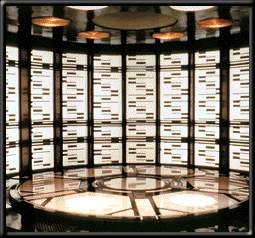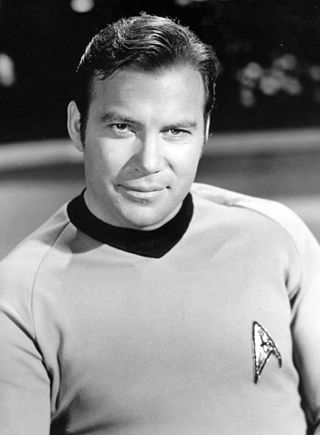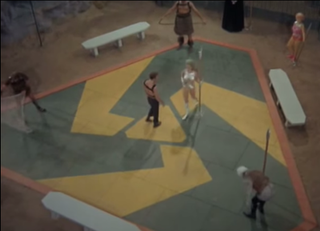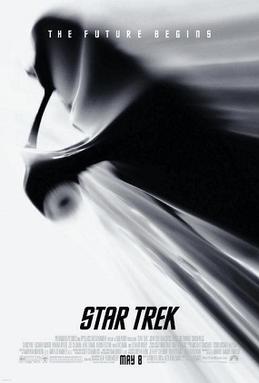
Star Trek: The Animated Series (TAS) is an American animated science fiction television series created by Gene Roddenberry. It originally aired simply under the title Star Trek, subtitled Created by Gene Roddenberry, on Saturday mornings from September 8, 1973 to October 12, 1974 on NBC, spanning 22 episodes over two seasons. The second series in the Star Trek franchise, it features mostly the same characters as Star Trek: The Original Series. Set in the 23rd century, the series follows the further adventures of the Starship USS Enterprise as it explores the galaxy.

A transporter is a fictional teleportation machine used in the Star Trek universe. Transporters allow for teleportation by converting a person or object into an energy pattern, then sending ("beaming") it to a target location or else returning it to the transporter, where it is reconverted into matter ("rematerialization").

James Tiberius Kirk, commonly known as Captain Kirk, is a fictional character in the Star Trek media franchise. Originally played by Canadian actor William Shatner, Kirk first appeared in Star Trek serving aboard the starship USS Enterprise as captain. Kirk leads his crew as they explore new worlds, new civilizations, and "boldly go where no man has gone before". Often, the characters of Spock and Leonard "Bones" McCoy act as his logical and emotional sounding boards, respectively. Kirk has also been portrayed in numerous films, books, comics, webisodes, and video games.

James Montgomery Doohan was a Canadian actor and author, best known for his role as Montgomery "Scotty" Scott in the television and film series Star Trek. Doohan's characterization of the Scottish chief engineer of the Starship Enterprise has become one of the most recognizable elements in the Star Trek franchise, and inspired many fans to pursue careers in engineering and other technical fields. He also made contributions behind the scenes, such as the initial development of the Klingon and Vulcan languages.
"The City on the Edge of Forever" is the twenty-eighth and penultimate episode of the first season of the American science fiction television series Star Trek. It was written by Harlan Ellison; contributors to and/or editors of the script included Steven W. Carabatsos, D. C. Fontana and Gene L. Coon. Gene Roddenberry made the final re-write. The episode was directed by Joseph Pevney and first aired on NBC on April 6, 1967.
"Assignment: Earth" is the twenty-sixth and final episode of the second season of the American science fiction television series Star Trek. Written by Art Wallace and directed by Marc Daniels, it was first broadcast on 29 March 1968.

Montgomery "Scotty" Scott is a fictional character in the science fiction franchise Star Trek. First portrayed by James Doohan in the original Star Trek series, Scotty also appears in the animated Star Trek series, 10 Star Trek films, the Star Trek: The Next Generation episode "Relics", and in numerous books, comics, and video games.
"The Lorelei Signal" is the fourth episode of the first season of the animated American science fiction television series Star Trek. It first aired in the NBC Saturday morning lineup on September 29, 1973, and was written by Margaret Armen, author of three Original Series episodes.
"A Taste of Armageddon" is the twenty-third episode of the first season of the American science fiction television series Star Trek. Written by Robert Hamner and Gene L. Coon and directed by Joseph Pevney, it was first broadcast on February 23, 1967.
"Wolf in the Fold" is the fourteenth episode of the second season of the American science fiction television series Star Trek. Written by Robert Bloch and directed by Joseph Pevney, it was first broadcast on December 22, 1967.
"Bread and Circuses" is the twenty-fifth and penultimate episode of the second season of the American science fiction television series Star Trek. Written by Gene Roddenberry and Gene L. Coon and directed by Ralph Senensky, it was first broadcast on March 15, 1968.

"The Gamesters of Triskelion" is the sixteenth episode of the second season of the American science fiction television series Star Trek. Written by Margaret Armen and directed by Gene Nelson, it was first broadcast January 5, 1968.
"Plato's Stepchildren" is the tenth episode of the third season of the American science fiction television series Star Trek. Written by Meyer Dolinsky and directed by David Alexander, it was first broadcast on November 22, 1968.
"Where No Fan Has Gone Before" is the eleventh episode in the fourth season of the American animated television series Futurama, and the 65th episode of the series overall. It originally aired on the Fox network in the United States on April 21, 2002. Set in a retro-futuristic 31st century, the series follows the adventures of the employees of Planet Express, an interplanetary delivery company. In this episode, the Planet Express team and most of the main cast of Star Trek: The Original Series face a court-martial after visiting the forbidden planet Omega 3.

Star Trek is a 2009 American science fiction action film directed by J. J. Abrams and written by Roberto Orci and Alex Kurtzman. It is the 11th film in the Star Trek franchise, and is also a reboot that features the main characters of the original Star Trek television series portrayed by a new cast, as the first in the rebooted film series. The film follows James T. Kirk and Spock aboard the USS Enterprise as they combat Nero, a Romulan from their future who threatens the United Federation of Planets. The story takes place in an alternate reality that features both an alternate birth location for James T. Kirk and further alterations in history stemming from the time travel of both Nero and the original series Spock. The alternate reality was created in an attempt to free the film and the franchise from established continuity constraints while simultaneously preserving original story elements.
"Relics" is the 130th episode of the syndicated American science fiction television series Star Trek: The Next Generation, the fourth episode of the sixth season.
"The Eye of the Beholder" is the fifteenth and penultimate episode of the first season of the American animated science fiction television series Star Trek. It first aired in the NBC Saturday morning lineup on January 5, 1974, and was written by David P. Harmon. Harmon also worked on the original Star Trek series, writing the episode "The Deadly Years" and co-writing "A Piece of the Action" with Gene L. Coon.

The science fiction multimedia franchise of Star Trek since its original debut in 1966 has been one of the most successful television series in science fiction television history and has had a large influence in popular culture as a result.

Yesterday's Son is a science fiction novel by American writer A. C. Crispin set in the fictional Star Trek Universe. It describes the events surrounding Spock's discovery that he has a son. Yesterday's Son and its sequel, Time for Yesterday, make up A. C. Crispin's "Yesterday Saga".

Star Trek Memories is the first of two volumes of autobiography dictated by William Shatner and transcribed by MTV editorial director Christopher Kreski. In the book, published in 1993, Shatner interviews several cast members of Star Trek: The Original Series and was surprised by the reaction of his fellow actors, who spoke negatively of their experiences with him on the show. James Doohan refused to be involved.










